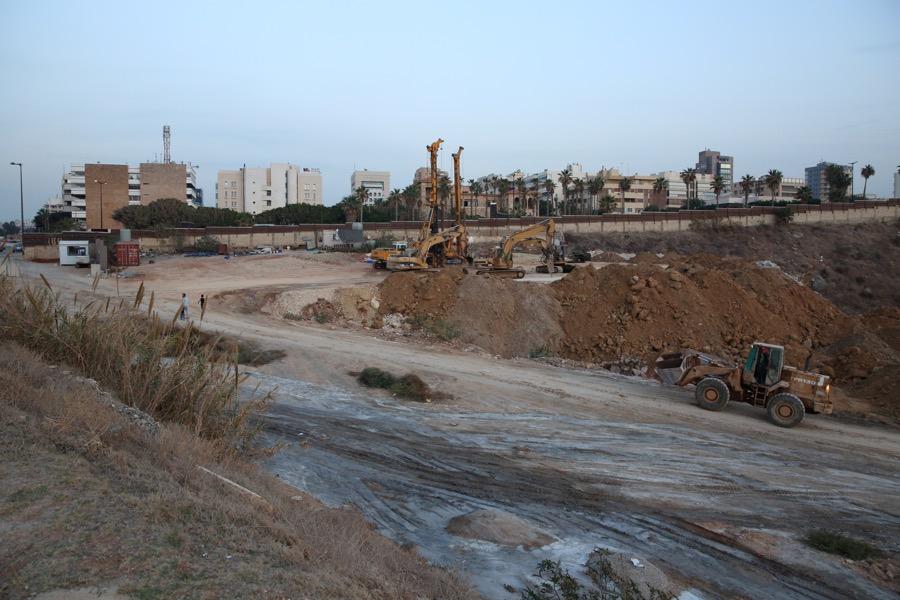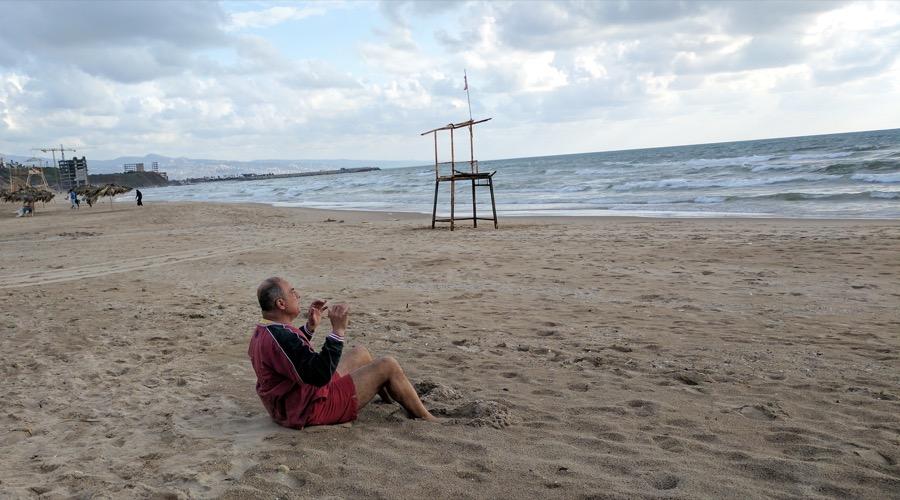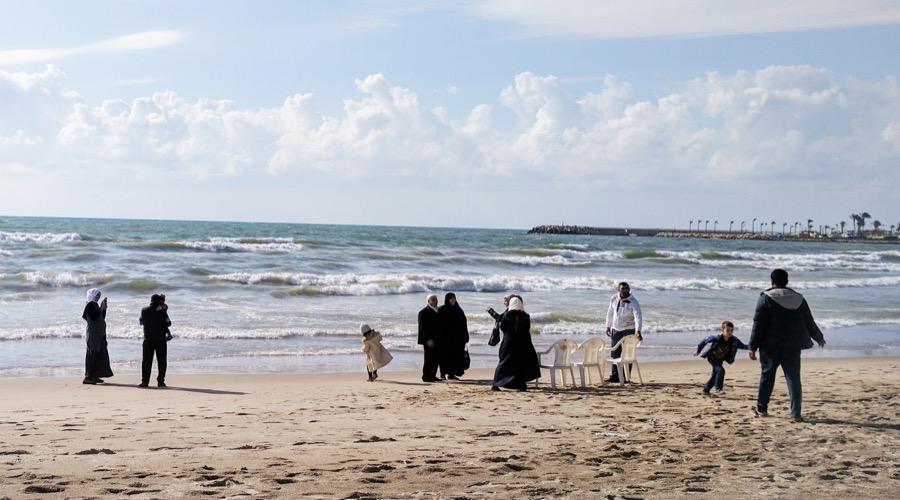Beirut’s only public beach is about to be taken over by an exclusive private resort
Ramlet al-Baida is the only public beach in Lebanon's seaside capital Beirut, in a city with a serious public space shortage.
For all its charm, Beirut can be a difficult place to live.
The roads are often clogged with traffic, the sidewalks are narrow and it seems as though there’s a construction site on every corner.
Most cities have outdoor places where residents can escape the noise and the chaos. But in Beirut, they’re in short supply — and if developers are allowed to have their way, there may be even fewer still.
Beirut’s only public beach — Ramlet al-Baida — is the latest battleground in the fight between Beirutis and authorities over public space in the city.
On a brisk, windy day at the beach, Mohammad Ayoub, an activist who campaigns for the protection of public land, stands facing a construction site jutting out onto the sand.

“All laws and international agreements, the constitution of Lebanon, say that everything on the sand is public space. So it’s strange to find someone who is pretending that he owns the sand,” he sighs.
The beach development now under construction is called the Eden Bay Resort, described by its developers in a promotional video as “an exclusive community by the sea.”
When finished — all 5,400 square feet of it — this “sanctuary of luxury and refinement” will feature high-end apartments, a five-star hotel, a spa, swimming pool and a jetty for residents to moor their yachts. It will cater to Beirut’s upper class and wealthy foreign visitors, and it will be unaffordable to most Beirutis.
This bothers activists campaigning against the development.
“Public space is the spirit of the city. It’s where the city meets. It’s where the children go and play, where young people go and do different kinds of activities and develop their talents. Without public space the people will be more stressful and bored. They will not feel like they belong to the city,” Ayoub says.
As far as Ayoub sees it, what little public space that Beirut has is under attack.
Across town, the largest and only substantial park in the city is under threat by plans to build a hospital. Farther down the coast from Ramlet al-Baida, a popular picnic spot on the rocks was closed to the public a couple of years back. Even the city’s downtown area is regularly closed off to the public for security reasons.
Densely populated, scarce public space
Detailed censuses of the population in Lebanon are hard to come by, for various reasons. But a 2013 survey by the Public Health Ministry estimated Beirut’s population to be around 420,000. That’s around 55,000 people per square mile. For comparison, New York City has around 11,000 people per square mile. Manhattan is more dense, at 72,000 people per square mile, but its public space is incomparably more.
.png&w=1920&q=75)
Beirut’s population is probably higher than that 2013 figure. More than 1 million Syrians have fled to Lebanon since their country’s war began. The United Nations says some 280,000 Syrian refugees are thought to be living in the Beirut area. Many of them are unregistered and off the books.
But the frustration over lack of public space isn’t just reserved for Beirut. Lebanon is blessed with a glorious coastline, lapped by the Mediterranean Sea, but most of its beaches are privately owned, and hefty entrance fees are common.
A little way down the beach from the resort project, a group of bronzed middle-aged men are playing volleyball.
“It’s my life, this beach,” says Adel, a 59-year-old banker, who asked that only his first name be used.
He and his friend Mohammad have been coming for 40 years. They met at the beach decades ago when Mohammad came to play paddle ball with his father. They even came here during the Lebanese civil war, when Israeli gunships were just off the coast and Palestinian guerrilla fighters ran the streets of West Beirut behind them.
“This place is for the poor people,” Adel continues. “Anywhere you want to play sport you have to pay in Beirut. But in Ramlet al-Baida, everything is free.”

Adel is worried that once this development is completed, the floodgates will open.
“If this building stays here all the beach will have buildings. If it stays, all the beach is gone,” he says.
The beachgoers we spoke to gave similar explanations for the public space shortage.
Mohammad blames “the mafia” — often a catch-all term for Lebanon’s political class, seen as corrupt by many.
Ahmad, a 41-year-old English teacher, is more philosophical.
“It’s because of greed. Because of money. Greed is what makes these places rare to find. If you were one of the businessmen and you had an opportunity to make 1,000 percent benefit to you. Are you going to say no?”
The developers behind the Eden Bay resort did not respond to requests for comment.
Mona Fawaz, an associate professor of urban planning and studies at the American University of Beirut, says the competing sectarian groups that have ruled Lebanon for decades are the main cause for the lack of public space.
“In most contexts, this custodian is the national state. Unfortunately in Lebanon the state has not played this role,” she says.
“The state in Lebanon has played the role of a small group of powerful, self-interested individuals who protect their own gains. There are therefore very powerful sects, whose presence is embodied in religious/sectarian buildings and also a powerful economic elite whose presence is embodied in high-end, exclusive developments such as the [redeveloped downtown] area and others."
The Beirut municipality, which approved the project, issued a statement back in November saying the land being developed was never public, and has been owned privately since 1932.
It added that “ongoing construction is based on building permits and abiding by construction laws.”
Activists fighting against Eden Bay were, until recently, hopeful they might be able to save the patch of beach. In February, Lebanon’s highest court ordered a temporary halt to construction while it studied the legality of the development.
Ayoub says the development flouts a 1915 law introduced during the French mandate over Lebanon. The law states that “the sea’s shore until the farthest area reached by waves during winter, as well as sand and rock shores belong to the public.”
However, the government has issued several decrees since then that opened up the way for legal development on the coast, and there is no evidence developers have broken any laws.
This April, the court rescinded the halt on the Eden Bay project. Construction has continued throughout this period anyway, apparently in violation of the order.
It’s a case of win some, lose some, for Ayoub. Despite the setbacks, he is sure the pro-public space advocates are winning a bigger battle.
“If you went back five years ago before we started, nobody was talking about public space. Now, everybody is talking about that. We don’t need to win tomorrow, but in the long term, we will get our city back,” he says.
